
The Taiping Rebellion, also known as the Taiping Civil War or the Taiping Revolution, was a civil war in China between the Manchu-led Qing dynasty and the Hakka-led Taiping Heavenly Kingdom. The conflict lasted for 14 years, from its outbreak in 1850 until the fall of Taiping-controlled Nanjing—which they had renamed Tianjing "heavenly capital"—in 1864. However, the last rebel forces were not defeated until August 1871. Estimates of the conflict's death toll range between 20 and 30 million people, representing 5–10% of China's population at that time. While the Qing ultimately defeated the rebellion, the victory came at a great cost to the state's economic and political viability.
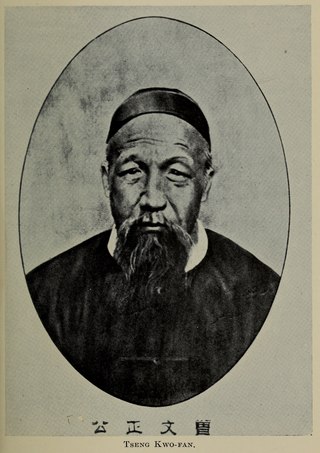
Zeng Guofan, Marquis Yiyong, birth name Zeng Zicheng, courtesy name Bohan (伯涵), was a Chinese statesman and military general of the late Qing dynasty. He is best known for raising and organizing the Xiang Army to aid the Qing military in suppressing the Taiping Rebellion and restoring the stability of the Qing Empire. Along with other prominent figures such as Zuo Zongtang and Li Hongzhang of his time, Zeng set the scene for the Tongzhi Restoration, an attempt to arrest the decline of the Qing dynasty. Zeng was known for his strategic perception, administrative skill and noble personality on Confucian practice, but also for his ruthlessness in repressing rebellions.

The First Battle of Changsha was the first of four attempts by Japan to take the city of Changsha, Hunan, during the second Sino-Japanese War. Coming two weeks after Germany's invasion of Poland on September 1, it was the first major battle of the war to fall within the time frame of what is widely considered World War II.

The Fourth Battle of Changsha was an invasion of the Chinese province of Hunan by Japanese troops near the end of the Second Sino-Japanese War, and was Japan's fourth and final attempt to capture Changsha. As such, it encompasses three separate conflicts: an invasion of the city of Changsha, and two invasions of Hengyang.
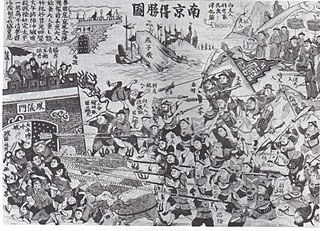
The Third Battle of Nanjing in 1864 was the last major engagement of the Taiping Rebellion in the Qing Empire. With the fall of Nanjing, the capital of the Taiping Heavenly Kingdom, the rebellion came to an end. The Hunan Army, an unpaid and barely fed militia commissioned by the Qing Empire, lost all their discipline and committed mass-scale random murder, wartime rape, looting and arson against the civilians of Nanjing, seen as "rebels". 200,000–300,000 "rebels" were reported dead by Zeng Guofan, the commander-in-chief of the Hunan Army.

The Jintian Uprising was an armed revolt formally declared by Hong Xiuquan, founder and leader of the God Worshippers, on 11 January 1851 during the late Qing dynasty of China. The uprising was named after the rebel base in Jintian, a town in Guangxi within present-day Guiping. It marked the beginning of the Taiping Rebellion.
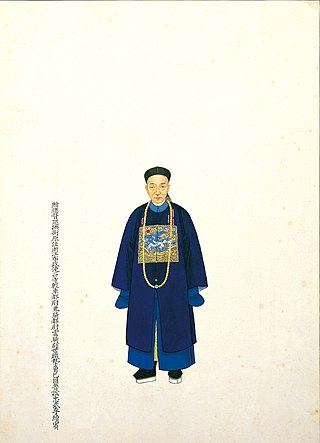
Li Xubin, courtesy name Di'an (迪庵) or Kehui (克惠), was a Chinese military general who lived in the Qing dynasty. He was a commander of the Xiang Army, a military force raised by the Qing government to help the imperial forces in suppressing the Taiping Rebellion. His younger brother, Li Xuyi, was also a commander in the Xiang Army.
The Battle of Sanhe was a major engagement of the Taiping Rebellion, occurring in 1858. During this battle, the elite troops of Zeng Guofan's Xiang Army were lost, along with one of its most capable commanders, Li Xubin as well as Zeng Guofan's brother Zeng Guohua.
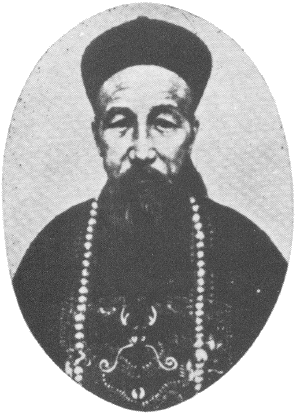
The Xiang Army or Hunan Army was a standing army organized by Zeng Guofan from existing regional and village militia forces called tuanlian to contain the Taiping Rebellion in Qing China. The name is taken from the Hunan region where the Army was raised. The Army was financed through local nobles and gentry, as opposed to through the centralized Manchu-led Qing dynasty. The army was mostly disbanded by Zeng after the re-capture of the Taiping capital at Nanking.

Zeng Guoquan, courtesy name Yuanfu, art name Shuchun, was a Chinese official and military leader of the late Qing dynasty. He was the ninth brother of Zeng Guofan, a prominent statesman and general, and a descendant of the philosopher Zengzi. He served in the Xiang Army, a standing military force organised by his brother to counter the Taiping rebels, and was nicknamed "Ninth Marshal" (九帥). He was known for his expertise in siege warfare, particularly the use of trenches, hence he was also nicknamed "Zeng the Iron Container" (曾鐵桶). During the conquest of Tianjing (Nanjing), the capital of the Taiping Heavenly Kingdom, Zeng was notorious for condoning massacres of the city populace, which resulted in him being called "Zeng the Butcher" (曾屠戶).
Jirhangga was an eminent Manchu official in the late Qing dynasty. He served as the Governor of Jiangsu, which belonged to Bordered Yellow Banner, and was appointed to that post by Imperial Commissioner Xiang Rong (向榮). He was killed in action by rebels during the Taiping Rebellion.
The Battle of Nanjing (1853) began after the fall of Wuhan on March 8, 1853, and ended with the fall of the capital city of Nanjing on March 19, 1853, to Taiping troops, a few days after the Qing Government evacuated the city.
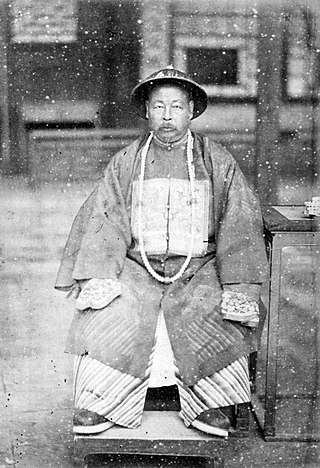
The Chu Army was a standing regional army organized by Zuo Zongtang. The name is taken from the Hunan region where the Army was raised. The Army was financed through local nobles and gentry, as opposed to the central government.
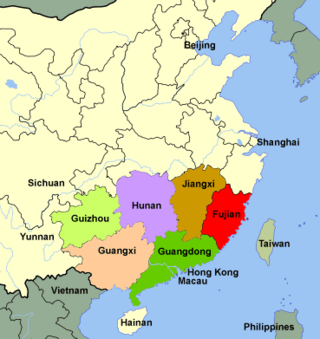
The Red Turban Rebellion of 1854–1856 was a rebellion by members of the Tiandihui in the Guangdong province of South China.

The Battle of Anqing (安慶之戰) was a prolonged siege of the prefecture-level city of Anqing in Anhui, China, initiated by Hunan Army forces loyal to the Qing Dynasty against the armies of the Taiping Heavenly Kingdom. The siege began in September 1860 and ended on September 5, 1861, when imperial forces under the command of Zeng Guoquan breached the walls of the city and occupied it.
Jiang Zhongyuan, courtesy name Changrui, (常孺) was a scholar and soldier from Hunan who fought for the Qing and against the Taiping Heavenly Kingdom during the Taiping Rebellion.

Tianxin Pavilion is an ancient Chinese pavilion located on the ancient city wall of Changsha, Hunan. The pavilion was first established in the 14th century, at the dawn of Ming dynasty (1368–1644), but because of war and natural disasters has been restored and renovated numerous times since then. The present version was completed in 1984. Tianxin Pavilion is composed of three pavilions, the three–stories main pavilion and the two–stories auxiliary pavilions. The two sides are connected with a long corridor. Alongside the Yueyang Tower, Pavilion of Prince Teng, Yellow Crane Tower, Stork Tower, Penglai Pavilion, Daguan Pavilion, Yuejiang Tower, Xi'an Bell and Drum Tower and Tianyi Pavilion, it is one of the "Ten Famous Chinese Historical and Cultural Towers and Pavilions" (十大中国历史文化名楼).
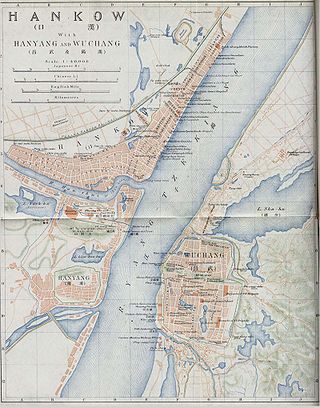
The Battle of Wuchang occurred in 1852 during the Taiping Rebellion in Wuchang, part of the modern-day city of Wuhan.
The Eastern Expedition encompassed the Taiping Heavenly Kingdom's efforts to capture the Yangtze River Delta, the provinces of Jiangsu, Anhui, and Zhejiang. Most of the areas would eventually be occupied by the Taipings, but they were notably repulsed at several locations, especially the city of Shanghai. Following the Jintian uprising in the southern province Guangxi and the beginning of open hostilities, Taiping forces attacked and captured Nanjing in central China by 1853. The Western Expedition captured cities along the Yangtze River like Zhenjiang, Anqing were captured later the same year.
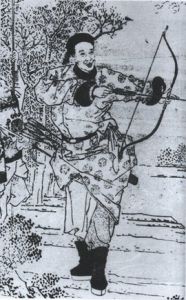
Taqibu, courtesy name Zhiting, member of the Tao Jia clan, a native of Manchuria's Bordered Yellow Banner, was promoted to the rank of retainer in his early years as an officer of the guards. Thereafter, he was expatriated to Hunan as a guerrilla. During this period, Taqibu's military talents were discovered by Zeng Guofan, and thus began to make a name for himself. On the recommendation of Zeng Guofan, Taqibu participated in the formation of the Hunan army and became Zeng Guofan's right-hand man. In the war with the Taiping Heavenly Kingdom, Taqibu led his troops to defeat the Taiping Army in Xiangtan, Yuezhou, Wuchang, and so on, and he was promoted to provincial military commander of Hunan, granted the title of Khatun Batulu Yong, and the position of riding lieutenant. In the war with the Taiping Heavenly Kingdom, Taqibu led his troops to defeat the Taiping Army in Xiangtan, Yuezhou, Wuchang, and so on, and he was promoted to governor of Hunan, granted the title of Khatun Batulu, and the position of cavalry lieutenant. Soon, Wuchang lost to the hands of the Taiping army, in the Qing army began to counterattack, the eve of the attack on Jiujiang, Taqibu died of illness due to exhaustion in the camp, the Qing court posthumously awarded the third-class lieutenant position.













